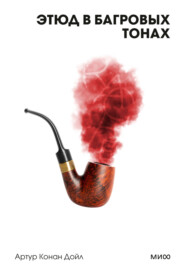По всем вопросам обращайтесь на: info@litportal.ru
(©) 2003-2025.
✖
The Tragedy of The Korosko
Настройки чтения
Размер шрифта
Высота строк
Поля
"You should look after your own manners, then."
"Gentlemen, gentlemen, here are the ladies!" cried Stephens, and the angry, over-strained men relapsed into a gloomy silence, pacing up and down, and jerking viciously at their moustaches. It is a very catching thing, ill-temper, for even Stephens began to be angry at their anger, and to scowl at them as they passed him. Here they were at a crisis in their fate, with the shadow of death above them, and yet their minds were all absorbed in some personal grievance so slight that they could hardly put it into words. Misfortune brings the human spirit to a rare height, but the pendulum still swings.
But soon their attention was drawn away to more important matters. A council of war was being held beside the wells, and the two Emirs, stern and composed, were listening to a voluble report from the leader of the patrol. The prisoners noticed that, though the fierce, old man stood like a graven image, the younger Emir passed his hand over his beard once or twice with a nervous gesture, the thin, brown fingers twitching among the long, black hair.
"I believe the Gippies are after us," said Belmont. "Not very far off either, to judge by the fuss they are making."
"It looks like it. Something has scared them."
"Now he's giving orders. What can it be? Here, Mansoor, what is the matter?"
The dragoman came running up with the light of hope shining upon his brown face.
"I think they have seen something to frighten them. I believe that the soldiers are behind us. They have given the order to fill the water-skins, and be ready for a start when the darkness comes. But I am ordered to gather you together, for the Moolah is coming to convert you all. I have already told him that you are all very much inclined to think the same with him."
How far Mansoor may have gone with his assurances may never be known, but the Mussulman preacher came walking towards them at this moment with a paternal and contented smile upon his face, as one who has a pleasant and easy task before him. He was a one-eyed man, with a fringe of grizzled beard and a face which was fat, but which looked as if it had once been fatter, for it was marked with many folds and creases. He had a green turban upon his head, which marked him as a Mecca pilgrim. In one hand he carried a small brown carpet, and in the other a parchment copy of the Koran. Laying his carpet upon the ground, he motioned Mansoor to his side, and then gave a circular sweep of his arm to signify that the prisoners should gather round him, and a downward wave which meant that they should be seated. So they grouped themselves round him, sitting on the short green sward under the palm-tree, these seven forlorn representatives of an alien creed, and in the midst of them sat the fat little preacher, his one eye dancing from face to face as he expounded the principles of his newer, cruder, and more earnest faith. They listened attentively and nodded their heads as Mansoor translated the exhortation, and with each sign of their acquiescence the Moolah became more amiable in his manner and more affectionate in his speech.
"For why should you die, my sweet lambs, when all that is asked of you is that you should set aside that which will carry you to everlasting Gehenna, and accept the law of Allah as written by his prophet, which will assuredly bring you unimaginable joys, as is promised in the Book of the Camel? For what says the chosen one?" – and he broke away into one of those dogmatic texts which pass in every creed as an argument. "Besides, is it not clear that God is with us, since from the beginning, when we had but sticks against the rifles of the Turks, victory has always been with us? Have we not taken El Obeid, and taken Khartoum, and destroyed Hicks and slain Gordon, and prevailed against every one who has come against us? How, then, can it be said that the blessing of Allah does not rest upon us?"
The Colonel had been looking about him during the long exhortation of the Moolah, and he had observed that the Dervishes were cleaning their guns, counting their cartridges, and making all the preparations of men who expected that they might soon be called upon to fight. The two Emirs were conferring together with grave faces, and the leader of the patrol pointed, as he spoke to them, in the direction of Egypt. It was evident that there was at least a chance of a rescue if they could only keep things going for a few more hours. The camels were not recovered yet from their long march, and the pursuers, if they were indeed close behind, were almost certain to overtake them.
"For God's sake, Fardet, try and keep him in play," said he. "I believe we have a chance if we can only keep the ball rolling for another hour or so."
But a Frenchman's wounded dignity is not so easily appeased. Monsieur Fardet sat moodily with his back against the palm-tree, and his black brows drawn down. He said nothing, but he still pulled at his thick, strong moustache.
"Come on, Fardet! We depend upon you," said Belmont.
"Let Colonel Cochrane do it," the Frenchman answered snappishly. "He takes too much upon himself this Colonel Cochrane."
"There! There!" said Belmont soothingly, as if he were speaking to a fractious child. "I am quite sure that the Colonel will express his regret at what has happened, and will acknowledge that he was in the wrong – "
"I'll do nothing of the sort," snapped the Colonel.
"Besides, that is merely a personal quarrel," Belmont continued hastily. "It is for the good of the whole party that we wish you to speak with the Moolah, because we all feel that you are the best man for the job."
But the Frenchman only shrugged his shoulders and relapsed into a deeper gloom.
The Moolah looked from one to the other, and the kindly expression began to fade away from his large, baggy face. His mouth drew down at the corners, and became hard and severe.
"Have these infidels been playing with us, then?" said he to the dragoman. "Why is it that they talk among themselves and have nothing to say to me?"
"He's getting impatient about it," said Cochrane. "Perhaps I had better do what I can, Belmont, since this damned fellow has left us in the lurch."
But the ready wit of a woman saved the situation.
"I am sure, Monsieur Fardet," said Mrs. Belmont, "that you, who are a Frenchman, and therefore a man of gallantry and honour, would not permit your own wounded feelings to interfere with the fulfilment of your promise and your duty towards three helpless ladies."
Fardet was on his feet in an instant, with his hand over his heart.
"You understand my nature, madame," he cried. "I am incapable of abandoning a lady. I will do all that I can in this matter. Now, Mansoor, you may tell the holy man that I am ready to discuss through you the high matters of his faith with him."
And he did it with an ingenuity which amazed his companions. He took the tone of a man who is strongly attracted, and yet has one single remaining shred of doubt to hold him back. Yet as that one shred was torn away by the Moolah, there was always some other stubborn little point which prevented his absolute acceptance of the faith of Islam. And his questions were all so mixed up with personal compliments to the priest and self-congratulations that they should have come under the teachings of so wise a man and so profound a theologian, that the hanging pouches under the Moolah's eyes quivered with his satisfaction, and he was led happily and hopefully onwards from explanation to explanation, while the blue overhead turned into violet, and the green leaves into black, until the great serene stars shone out once more between the crowns of the palm-trees.
"As to the learning of which you speak, my lamb," said the Moolah, in answer to some argument of Fardet's, "I have myself studied at the University of El Azhar at Cairo, and I know that to which you allude. But the learning of the faithful is not as the learning of the unbeliever, and it is not fitting that we pry too deeply into the ways of Allah. Some stars have tails, oh my sweet lamb, and some have not; but what does it profit us to know which are which? For God made them all, and they are very safe in His hands. Therefore, my friend, be not puffed up by the foolish learning of the West, and understand that there is only one wisdom, which consists in following the will of Allah as His chosen prophet has laid it down for us in this book. And now, my lambs, I see that you are ready to come into Islam, and it is time, for that bugle tells that we are about to march, and it was the order of the excellent Emir Abderrahman that your choice should be taken, one way or the other, before ever we left the wells."
"Yet, my father, there are other points upon which I would gladly have instruction," said the Frenchman, "for, indeed, it is a pleasure to hear your clear words after the cloudy accounts which we have had from other teachers."
But the Moolah had risen, and a gleam of suspicion twinkled in his single eye.
"This further instruction may well come afterwards," said he, "since we shall travel together as far as Khartoum, and it will be a joy to me to see you grow in wisdom and in virtue as we go." He walked over to the fire, and stooping down, with the pompous slowness of a stout man, he returned with two half-charred sticks, which he laid cross-wise upon the ground. The Dervishes came clustering over to see the new converts admitted into the fold. They stood round in the dim light, tall and fantastic, with the high necks and supercilious heads of the camels swaying above them.
"Now," said the Moolah, and his voice had lost its conciliatory and persuasive tone, "there is no more time for you. Here upon the ground I have made out of two sticks the foolish and superstitious symbol of your former creed. You will trample upon it, as a sign that you renounce it, and you will kiss the Koran, as a sign that you accept it, and what more you need in the way of instruction shall be given to you as you go."
They stood up, the four men and the three women, to meet the crisis of their fate. None of them, except perhaps Miss Adams and Mrs. Belmont, had any deep religious convictions. All of them were children of this world, and some of them disagreed with everything which that symbol upon the earth represented. But there was the European pride, the pride of the white race which swelled within them, and held them to the faith of their countrymen. It was a sinful, human, un-Christian motive, and yet it was about to make them public martyrs to the Christian creed. In the hush and tension of their nerves low sounds grew suddenly loud upon their ears. Those swishing palm-leaves above them were like a swift-flowing river, and far away they could hear the dull, soft thudding of a galloping camel.
"There's something coming," whispered Cochrane. "Try and stave them off for five minutes longer, Fardet."
The Frenchman stepped out with a courteous wave of his uninjured arm, and the air of a man who is prepared to accommodate himself to anything.
"You will tell this holy man that I am quite ready to accept his teaching, and so I am sure are all my friends," said he to the dragoman. "But there is one thing which I should wish him to do in order to set at rest any possible doubts which may remain in our hearts. Every true religion can be told by the miracles which those who profess it can bring about. Even I who am but a humble Christian, can, by virtue of my religion, do some of these. But you, since your religion is superior, can no doubt do far more, and so I beg you to give us a sign that we may be able to say that we know that the religion of Islam is the more powerful."
Behind all his dignity and reserve, the Arab has a good fund of curiosity. The hush among the listening Arabs showed how the words of the Frenchman as translated by Mansoor appealed to them.
"Such things are in the hands of Allah," said the priest. "It is not for us to disturb His laws. But if you have yourself such powers as you claim, let us be witnesses to them."
The Frenchman stepped forward, and raising his hand he took a large, shining date out of the Moolah's beard. This he swallowed and immediately produced once more from his left elbow. He had often given his little conjuring entertainment on board the boat, and his fellow-passengers had had some good-natured laughter at his expense, for he was not quite skilful enough to deceive the critical European intelligence. But now it looked as if this piece of obvious palming might be the point upon which all their fates would hang. A deep hum of surprise rose from the ring of Arabs, and deepened as the Frenchman drew another date from the nostril of a camel and tossed it into the air, from which, apparently, it never descended. That gaping sleeve was obvious enough to his companions, but the dim light was all in favour of the performer. So delighted and interested was the audience that they paid little heed to a mounted camel-man who trotted swiftly between the palm trunks. All might have been well had not Fardet, carried away by his own success, tried to repeat his trick once more, with the result that the date fell out of his palm, and the deception stood revealed. In vain he tried to pass on at once to another of his little stock. The Moolah said something, and an Arab struck Fardet across the shoulders with the thick shaft of his spear.
"We have had enough child's play," said the angry priest. "Are we men or babes, that you should try to impose upon us in this manner? Here is the cross and the Koran – which shall it be?"
Fardet looked helplessly round at his companions.
"I can do no more; you asked for five minutes. You have had them," said he to Colonel Cochrane.
"And perhaps it is enough," the soldier answered. "Here are the Emirs."
The camel-man, whose approach they had heard from afar, had made for the two Arab chiefs, and had delivered a brief report to them, stabbing with his forefinger in the direction from which he had come. There was a rapid exchange of words between the Emirs, and then they strode forward together to the group around the prisoners. Bigots and barbarians, they were none the less two most majestic men, as they advanced through the twilight of the palm grove. The fierce old greybeard raised his hand and spoke swiftly in short, abrupt sentences, and his savage followers yelped to him like hounds to a huntsman. The fire that smouldered in his arrogant eyes shone back at him from a hundred others. Here were to be read the strength and danger of the Mahdi movement; here in these convulsed faces, in that fringe of waving arms, in these frantic, red-hot souls, who asked nothing better than a bloody death, if their own hands might be bloody when they met it.
"Have the prisoners embraced the true faith?" asked the Emir Abderrahman, looking at them with his cruel eyes.
The Moolah had his reputation to preserve, and it was not for him to confess to a failure.
"They were about to embrace it, when –
"Let it rest for a little time, O Moolah." He gave an order, and the Arabs all sprang for their camels. The Emir Wad Ibrahim filed off at once with nearly half the party. The others were mounted and ready, with their rifles unslung.
"What's happened?" asked Belmont.
"Things are looking up," cried the Colonel. "By George, I think we are going to come through all right. The Gippy Camel Corps are hot on our trail."

















